| Listing 1 - 6 of 6 |
Sort by
|
Book
Year: 1999 Publisher: Poitiers: Université de Poitiers. UFR de langues et littératures,
Abstract | Keywords | Export | Availability | Bookmark
 Loading...
Loading...Choose an application
- Reference Manager
- EndNote
- RefWorks (Direct export to RefWorks)
Human figure in art --- Body, Human, in literature --- Autopsy --- Human anatomy
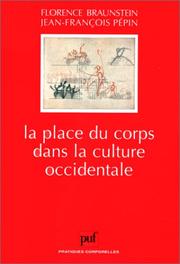
ISBN: 2130500374 9782130500377 Year: 1999 Volume: *14 Publisher: Paris : PUF - Presses Universitaires de France,
Abstract | Keywords | Export | Availability | Bookmark
 Loading...
Loading...Choose an application
- Reference Manager
- EndNote
- RefWorks (Direct export to RefWorks)
Human body --- Ethnology --- Mind and body --- Corps humain --- Anthropologie sociale et culturelle --- Esprit et corps --- Social aspects --- Aspect social --- Body, Human --- Body, Human (Philosophy) --- Body, Human, in literature. --- Social aspects. --- Human body in literature --- Human body (Philosophy) --- Body, Human, in literature --- Human figure in literature --- Philosophy --- Body [Human ] (Philosophy) --- History --- Sociologie du corps --- Corps (philosophie) --- Dans l'art --- Body, Human - Social aspects.
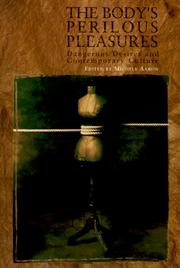
ISBN: 058515922X 9780585159225 074860961X 9780748609611 074860961X Year: 1999 Publisher: [Place of publication not identified] Edinburgh University Press
Abstract | Keywords | Export | Availability | Bookmark
 Loading...
Loading...Choose an application
- Reference Manager
- EndNote
- RefWorks (Direct export to RefWorks)
Focusing on contemporary film and fiction, this book examines the construction of the body, both within cultural production and as a cultural product itself, and provides a provocative engagement with the cultural representation of the body and its 'dangerous desires'. Transgressive interpretations of conventional imagery merge with critical considerations of subcultural forms. The topics discussed include male erotic objectification; narcissistic masculinity; male to female transvestism; cyborgs and female desire; body piercing; 'demonic' children in film; queer cinema; vampires in women's fiction; the cannibal film; cyborgs and necrophiliac desire; AIDS and reincarnation films. The films discussed include Videodrome, Dead Ringers, M. Butterfly, The Crying Game, Romeo is Bleeding, The Omen, Heavenly Creatures, Sister My Sister, Silenceof the Lambs and Delicatessen.
Human body in motion pictures --- Sex in motion pictures --- Human body in literature --- Sex in literature --- Culture in motion pictures --- Music, Dance, Drama & Film --- Film --- Motion pictures --- Body, Human, in literature --- Human figure in literature --- Sex in moving-pictures --- Erotic films --- Pornographic films --- Body, Human, in motion pictures
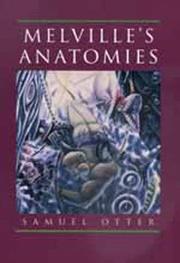
ISBN: 058525026X 0520918010 9780520918016 9780585250267 0520205812 0520205820 9780520205819 9780520205826 Year: 1999 Publisher: Berkeley, Calif. University of California Press
Abstract | Keywords | Export | Availability | Bookmark
 Loading...
Loading...Choose an application
- Reference Manager
- EndNote
- RefWorks (Direct export to RefWorks)
In fascinating new contextual readings of four of Herman Melville's novels-Typee, White-Jacket, Moby-Dick, and Pierre-Samuel Otter delves into Melville's exorbitant prose to show how he anatomizes ideology, making it palpable and strange. Otter portrays Melville as deeply concerned with issues of race, the body, gender, sentiment, and national identity. He articulates a range of contemporary texts (narratives of travelers, seamen, and slaves; racial and aesthetic treatises; fiction; poetry; and essays) in order to flesh out Melville's discursive world.Otter presents Melville's works as "inside narratives" offering material analyses of consciousness. Chapters center on the tattooed faces in Typee, the flogged bodies in White-Jacket, the scrutinized heads in Moby-Dick, and the desiring eyes and eloquent, constricted hearts of Pierre. Otter shows how Melville's books tell of the epic quest to know the secrets of the human body. Rather than dismiss contemporary beliefs about race, self, and nation, Melville inhabits them, acknowledging their appeal and examining their sway.Meticulously researched and brilliantly argued, this groundbreaking study links Melville's words to his world and presses the relations between discourse and ideology. It will deeply influence all future studies of Melville and his work.
Human body in literature --- American Literature --- English --- Languages & Literatures --- Body, Human, in literature --- Human figure in literature --- Human body in literature. --- Melville, Herman, --- Knowledge --- Anatomy. --- Melville, Herman --- Melvill, German --- Melville, Hermann --- Meville, Herman --- Melvil, Cherman --- Mai-erh-wei-erh, Ho-erh-man --- Melṿil, Herman --- Tarnmoor, Salvator R. --- מלוויל, הרמן, --- מלויל, הרמן, --- ميلڤيل، هرمن، --- 麥爾維爾, --- Virginian spending July in Vermont, --- Melvill, Herman,
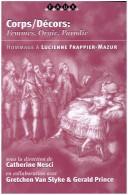
ISBN: 9042004266 Year: 1999 Volume: 171
Abstract | Keywords | Export | Availability | Bookmark
 Loading...
Loading...Choose an application
- Reference Manager
- EndNote
- RefWorks (Direct export to RefWorks)
Comparative literature --- Thematology --- anno 1800-1999 --- anno 1700-1799 --- Body [Human ] in literature --- Corps humain dans la littérature --- Femme (Théologie chrétienne) dans la littérature --- Femmes dans la littérature --- Femmes dans la poésie --- Femmes dans le théâtre --- Human body in literature --- Lichaam [Menselijk ] in de literatuur --- Menselijk lichaam in de literatuur --- Vrouw (Christelijke theologie) in de literatuur --- Vrouwen in de literatuur --- Vrouwen in de poëzie --- Vrouwen in het toneel --- Woman (Christian theology) in literature --- Women in drama --- Women in literature --- Women in poetry --- 82:396 --- 82.04 --- Body, Human, in literature --- French literature --- -Women in literature --- Human figure in literature --- Literatuur en feminisme --- Literaire thema's --- History and criticism --- 82.04 Literaire thema's --- 82:396 Literatuur en feminisme
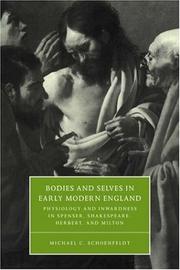
ISBN: 0521669022 0521630738 9780521630733 9780521669023 Year: 1999 Volume: 34 Publisher: New York Cambridge Melbourne Cambridge University Press
Abstract | Keywords | Export | Availability | Bookmark
 Loading...
Loading...Choose an application
- Reference Manager
- EndNote
- RefWorks (Direct export to RefWorks)
Michael Schoenfeldt's fascinating study explores the close relationship between selves and bodies, psychological inwardness and corporeal processes, as they are represented in early modern English literature. After Galen, the predominant medical paradigm of the period envisaged a self governed by humors, literally embodying inner emotion by locating and explaining human passion within a taxonomy of internal organs and fluids. It thus gave a profoundly material emphasis to behavioural phenomena, giving the poets of the period a vital and compelling vocabulary for describing the ways in which selves inhabit and experience bodies. In contrast to much recent work on the body which has emphasized its exuberant 'leakiness' as a principal of social liberation amid oppressive regimes, Schoenfeldt establishes the emancipatory value that the Renaissance frequently located not in moments of festive release, but in the exercise of regulation, temperance and self-control.
Body [Human ] in literature --- Corps humain dans la littérature --- Esprit et corps dans la littérature --- Geest en lichaam in de literatuur --- Human body in literature --- Ik in de literatuur --- Lichaam [Menselijk ] in de literatuur --- Menselijk lichaam in de literatuur --- Mind and body in literature --- Moi dans la littérature --- Psychologie als thema in de literatuur --- Psychologie comme thème dans la littérature --- Psychologie dans la littérature --- Psychologie in de literatuur --- Psychology as a theme in literature --- Psychology in literature --- Self in literature --- Body, Human, in literature. --- English literature --- Human body in literature. --- Mind and body in literature. --- Psychology in literature. --- Renaissance --- Self in literature. --- Psychological aspects. --- History and criticism. --- Shakespeare, William, --- Spenser, Edmund, --- Herbert, George, --- Milton, John, --- Knowledge --- Physiology. --- Soi dans la littérature --- Zelf in de literatuur --- Early modern, 1500-1700 --- History and criticism --- Shakespeare, William --- Physiology --- Spenser, Edmund --- Herbert, George --- Psychological aspects --- England --- Milton, John
| Listing 1 - 6 of 6 |
Sort by
|

 Search
Search Feedback
Feedback About UniCat
About UniCat  Help
Help News
News